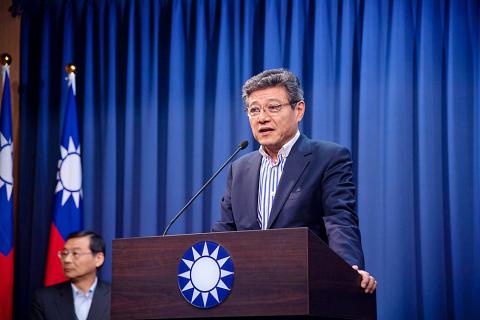Chinese Nationalist Party (KMT) Acting Chairman Lin Rong-te (林榮德) said he would urge all Central Standing Committee (CSC) members older than 60 to step down tomorrow, a call that has received a mixed reaction from other KMT members.
The committee is scheduled to meet tomorrow.
Lin, who turns 61 this year, told the Chinese-language China Times in an interview published on its Web site on Sunday evening that he would be resigning from the committee.

Photo: CNA
The departure of older members would allow younger KMT members to join the decisionmaking body, the newspaper cited him as saying.
As acting party chairman, he hopes to create a new platform for reforming the KMT, so his replacement could lead the party in exploring its future policies, he said.
Hopefully, KMT mayors, county and city councilors, and legislators would make up 80 to 90 percent of the CSC membership, he said.
Lin became acting chairman on Wednesday last week after former chairman Wu Den-yih (吳敦義) stepped down to take responsibility for the party’s drubbing in the Jan. 11 elections.
A new chairperson and Central Standing Committee are to be elected on March 7.
KMT Acting Secretary-General William Tseng (曾銘宗) yesterday told reporters that he strongly supports Lin’s idea, but the way in which it should be carried out should be “subtler.”
“Hopefully, we would able to reach an agreement with relatively senior committee members who do not have public support, so that they would forgo committee elections in the future,” he said at the Legislative Yuan in Taipei.
During tomorrow’s meeting, he also hopes to get a plan passed to establish a reform committee that would consist of the party’s mayors, county commissioners, legislators and councilors, as well as members who can represent the younger generations and academia, he said.
The KMT’s reform plans should cover four key areas: restructuring its decisionmaking body, its cross-strait stance and finances, and recruiting younger members, he said.
The KMT spends more than NT$200 million (US$6.68 million) annually, so it must reduce expenditures and increase its revenue, he said.
Lee Cho-ping (李昭平), who resigned from the CSC last week, agreed with Lin’s proposal to have older members step down.
The party must reform completely and allow its younger members to take on more responsibilities if it is to improve, he said.
However, CSC member Lu Hsueh-chang (呂學樟) said the key to reform should be passion, not age.
KMT regulations state that anyone who is a Central Committee or Central Advisory Committee member can take part in the CSC election, and there is no ban on those older than 60 from running, Lu said.
KMT legislator-at-large nominee Yen Yu-lan (葉毓蘭) said that Lin’s proposal could constitute age discrimination.
The party should include as many people as possible in its reforms, instead of “viewing things in black and white,” she told reporters in Taichung.
Additional reporting by Lin Liang-sheng and Chang Ching-ya

DEFENDING DEMOCRACY: Taiwan shares the same values as those that fought in WWII, and nations must unite to halt the expansion of a new authoritarian bloc, Lai said The government yesterday held a commemoration ceremony for Victory in Europe (V-E) Day, joining the rest of the world for the first time to mark the anniversary of the end of World War II in Europe. Taiwan honoring V-E Day signifies “our growing connections with the international community,” President William Lai (賴清德) said at a reception in Taipei on the 80th anniversary of V-E Day. One of the major lessons of World War II is that “authoritarianism and aggression lead only to slaughter, tragedy and greater inequality,” Lai said. Even more importantly, the war also taught people that “those who cherish peace cannot

STEADFAST FRIEND: The bills encourage increased Taiwan-US engagement and address China’s distortion of UN Resolution 2758 to isolate Taiwan internationally The Presidential Office yesterday thanked the US House of Representatives for unanimously passing two Taiwan-related bills highlighting its solid support for Taiwan’s democracy and global participation, and for deepening bilateral relations. One of the bills, the Taiwan Assurance Implementation Act, requires the US Department of State to periodically review its guidelines for engagement with Taiwan, and report to the US Congress on the guidelines and plans to lift self-imposed limitations on US-Taiwan engagement. The other bill is the Taiwan International Solidarity Act, which clarifies that UN Resolution 2758 does not address the issue of the representation of Taiwan or its people in

US Indo-Pacific Commander Admiral Samuel Paparo on Friday expressed concern over the rate at which China is diversifying its military exercises, the Financial Times (FT) reported on Saturday. “The rates of change on the depth and breadth of their exercises is the one non-linear effect that I’ve seen in the last year that wakes me up at night or keeps me up at night,” Paparo was quoted by FT as saying while attending the annual Sedona Forum at the McCain Institute in Arizona. Paparo also expressed concern over the speed with which China was expanding its military. While the US

‘FALLACY’: Xi’s assertions that Taiwan was given to the PRC after WWII confused right and wrong, and were contrary to the facts, the Ministry of Foreign Affairs said The Ministry of Foreign Affairs yesterday called Chinese President Xi Jinping’s (習近平) claim that China historically has sovereignty over Taiwan “deceptive” and “contrary to the facts.” In an article published on Wednesday in the Russian state-run Rossiyskaya Gazeta, Xi said that this year not only marks 80 years since the end of World War II and the founding of the UN, but also “Taiwan’s restoration to China.” “A series of instruments with legal effect under international law, including the Cairo Declaration and the Potsdam Declaration have affirmed China’s sovereignty over Taiwan,” Xi wrote. “The historical and legal fact” of these documents, as well